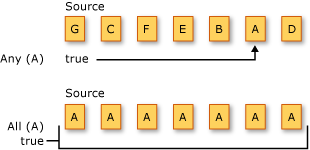Observação
O acesso a essa página exige autorização. Você pode tentar entrar ou alterar diretórios.
O acesso a essa página exige autorização. Você pode tentar alterar os diretórios.
As operações de quantificador retornam um Boolean valor que indica se alguns ou todos os elementos em uma sequência atendem a uma condição.
A ilustração a seguir ilustra duas operações de quantificador diferentes em duas sequências de origem diferentes. A primeira operação pergunta se algum dos elementos é o caractere 'A'. A segunda operação pergunta se todos os elementos são o caractere 'A'. Ambos os métodos retornam true neste exemplo.

Os métodos de operador de consulta padrão que executam operações de quantificador são listados na seção a seguir.
Métodos
| Nome do método | Descrição | Sintaxe da expressão de consulta do Visual Basic | Mais informações |
|---|---|---|---|
| Todos | Determina se todos os elementos em uma sequência atendem a uma condição. | Aggregate … In … Into All(…) |
Enumerable.All Queryable.All |
| Qualquer | Determina se algum elemento em uma sequência atende a uma condição. | Aggregate … In … Into Any() |
Enumerable.Any Queryable.Any |
| Contém | Determina se uma sequência contém um elemento especificado. | Não aplicável. | Enumerable.Contains Queryable.Contains |
Exemplos de sintaxe de expressão de consulta
Esses exemplos usam a Aggregate cláusula no Visual Basic como parte da condição de filtragem em uma consulta LINQ.
O exemplo a seguir usa a cláusula Aggregate e o método de extensão All para retornar aquelas pessoas de uma coleção cujos animais de estimação são todos mais velhos do que uma idade especificada.
Class Person
Public Property Name As String
Public Property Pets As Pet()
End Class
Class Pet
Public Property Name As String
Public Property Age As Integer
End Class
Sub All()
Dim barley As New Pet With {.Name = "Barley", .Age = 4}
Dim boots As New Pet With {.Name = "Boots", .Age = 1}
Dim whiskers As New Pet With {.Name = "Whiskers", .Age = 6}
Dim bluemoon As New Pet With {.Name = "Blue Moon", .Age = 9}
Dim daisy As New Pet With {.Name = "Daisy", .Age = 3}
Dim charlotte As New Person With {.Name = "Charlotte", .Pets = New Pet() {barley, boots}}
Dim arlene As New Person With {.Name = "Arlene", .Pets = New Pet() {whiskers}}
Dim rui As New Person With {.Name = "Rui", .Pets = New Pet() {bluemoon, daisy}}
' Create the list of Person objects that will be queried.
Dim people As New System.Collections.Generic.List(Of Person)(New Person() {charlotte, arlene, rui})
Dim query = From pers In people
Where (Aggregate pt In pers.Pets Into All(pt.Age > 2))
Select pers.Name
Dim sb As New System.Text.StringBuilder()
For Each name As String In query
sb.AppendLine(name)
Next
' Display the results.
MsgBox(sb.ToString())
' This code produces the following output:
' Arlene
' Rui
End Sub
O próximo exemplo usa a Aggregate cláusula e o Any método de extensão para retornar de uma coleção aquelas pessoas que têm pelo menos um animal de estimação mais antigo que uma idade especificada.
Class Person
Public Property Name As String
Public Property Pets As Pet()
End Class
Class Pet
Public Property Name As String
Public Property Age As Integer
End Class
Sub Any()
Dim barley As New Pet With {.Name = "Barley", .Age = 4}
Dim boots As New Pet With {.Name = "Boots", .Age = 1}
Dim whiskers As New Pet With {.Name = "Whiskers", .Age = 6}
Dim bluemoon As New Pet With {.Name = "Blue Moon", .Age = 9}
Dim daisy As New Pet With {.Name = "Daisy", .Age = 3}
Dim charlotte As New Person With {.Name = "Charlotte", .Pets = New Pet() {barley, boots}}
Dim arlene As New Person With {.Name = "Arlene", .Pets = New Pet() {whiskers}}
Dim rui As New Person With {.Name = "Rui", .Pets = New Pet() {bluemoon, daisy}}
' Create the list of Person objects that will be queried.
Dim people As New System.Collections.Generic.List(Of Person)(New Person() {charlotte, arlene, rui})
Dim query = From pers In people
Where (Aggregate pt In pers.Pets Into Any(pt.Age > 7))
Select pers.Name
Dim sb As New System.Text.StringBuilder()
For Each name As String In query
sb.AppendLine(name)
Next
' Display the results.
MsgBox(sb.ToString())
' This code produces the following output:
' Rui
End Sub
